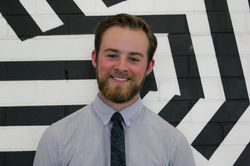 |
|---|
Brendan Pedersen
Before I walked into the office of Kiplinger’s Personal Finance, I had no idea what to expect. I hadn’t heard of the publication before I saw it listed in the magazine packet from ASME. I hadn’t been to D.C. since I was 12, and I had never worked inside a professional newsroom before. I aso knew nothing – nothing – about personal finance. That said, Kiplinger’s isn’t a typical publication, D.C. isn’t a typical town and this isn’t exactly a typical time.
Kiplinger’s is weird — structurally, at least. The magazine is family-owned and has been for decades, opting not to lounge in the shade of a Condé Nast or Hearst umbrella. Knight A. Kiplinger, today’s editor in chief and grandson of the magazine’s founder, described the company as “iconoclastic” during a lunch with interns one day, like a quirky but resilient second cousin at the Thanksgiving table of news media.
Kiplinger’s is a finance magazine. I am not a finance person. Throughout the summer, I would joke that my dad worked in finance, and I’d chosen to pursue journalism as a means of rebellion — you can see how well that turned out (laugh track). But when it came down to it, my inexperience couldn’t have mattered less. Being out of my element wasn’t the most comfortable feeling in the world — pitch meetings for the Investing section of the magazine still give me fever dreams — but I learned a heck of a lot.
As a journalist, I’m not sure anything could be as valuable as learning how to take a subject you know nothing about and make it matter to a readership. More than that, since Kiplinger’s is a service-driven publication, we needed to make every story actionable and important to our readers. And if Kiplinger’s can make a 20-something millennial write about retirement spending and exchange-traded funds with a passionate zeal (which they did), they’ve achieved something remarkable. They treated me like family, and I am deeply grateful to have had the chance to work alongside them.
Brendan Pedersen is a Chicago native studying political science and journalism at DePaul University. He lead a congressional debate team and worked as a peer tutor at the Center for Writing-based Learning for two years before becoming editor in chief of 14 East, the school’s independent weekly magazine. He writes about history, policy, media and public data.



